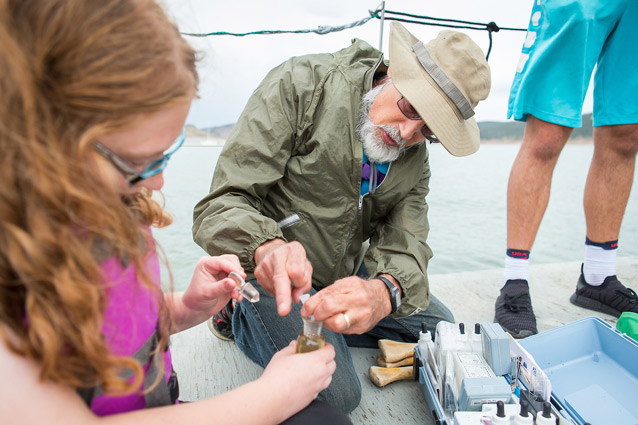When people say “research,” what do they mean? A quick search on the internet, usually. But in college, research takes on a whole new meaning. At its core, research is looking for the answer to a question that someone else hasn't already answered, building on the body of human knowledge. It's a key part of graduate programs and many career fields — so it's especially valuable to start getting research experience as an undergraduate.
Undergraduate research experience can look like a number of things, according to Janice Dickensheets, faculty fellow in the Office of Undergraduate Research at UNC. It can range from formal, clinical studies, to helping run a publication (like UNC's PUGS or UAP), to creative works and beyond.
Research seeks to answer questions you can’t look up on your own or to develop things not yet created.
Research should present falsifiable claims and findings that haven't been uncovered yet. A falsifiable claim is a claim that can be disproven by countering studies or statements. As the blog Explorable puts it:
Falsifiability is the assertion that for any hypothesis to have credence, it must be inherently disprovable before it can become accepted as a scientific hypothesis or theory.
Basically, the more a piece of research can stand up to scholarly critiques, the more compelling the research. It should have some mechanism which might allow others to disprove it. This is an important part of the scientific method. Creative work, naturally, is an original piece, and might not be falsifiable.
Every research topic looks different.
The research approach for undergraduates differs depending on the field and focus of research, Dickensheets says. Some common types include working with faculty on their research, enrolling in a research program and conducting your own studies, or even creative endeavors. The actual nature of your research could carry you to the lab to conduct experiments and dissections or across the world to study poaching of endangered animals.
A lot of the time, it’s interdisciplinary.
Undergraduate research can cross disciplines. A student studying cello techniques of the 19th and 20th century might also need to conduct statistical analyses to understand which notes appear most often. Or a doctor trying to figure out if a medicine works could not only take detailed blood samples, but also ask the subjects how the medicine made them feel and then write up a paper on it.
Research can be artistic.
In some institutions, research might look like a manuscript, a book of poems or a sculpture. More traditional types of research include qualitative research (finding answers about the quality of something, such as by interviewing someone about their experience being raised by their grandparents) and quantitative research (using numbers to find answers, such as by conducting a survey where people answer questions about being raised by their grandparents "on a scale of 1-7").
It’s possible to get grants or even get paid.
Some research institutions, such as UNC, provide funds to help facilitate research, fund studies and present at conferences. In some institutions, it might even be possible for undergraduate researchers to take a paid research position in lieu of a job, earning them research experience and also payment. UNC offers stipends and grants to its undergraduate researchers.
Research can be a great way to improve critical thinking…
According to both Dickensheets and a paper written at Samford University by John K. Petrella and Alan P. Jung, undergraduate research can help students understand how the scientific method works or aid them in their ability to answer difficult or abstract questions.
“I think the biggest benefit to undergraduate research is the ability to be a critical thinker. It is one of the places where a student can’t just get away with memorizing and regurgitating answers. They have to think about the question at hand. Figure out what research the world has already done, and posit a solution, interpretation or summarization (generally) of that research, often providing answers or other questions that can become the impetus for additional research.” – Janice Dickensheets
Meet mentors…
Undergraduate research likely will require you to have a faculty member standing by to help you conduct and refine your research or answer any questions you might have. Often times the student will be asked to go and find their own faculty mentor, so it’s important to find one that aligns with your research interests.
…or position yourself well for graduate school.
“You go to graduate school to do research, so they want to know that you can do research and that you’ll be good at it,” says Matthew Paoletti, then a graduate student studying for his doctorate in physics, in a 2007 Sciencemag.org article. According to the article, 74 percent of graduate students in chemistry had some research experience prior to grad school. A good GPA isn’t nearly as impressive to admissions counselors as a published paper is, according to the University of Illinois press.
Interested in researching at the undergraduate level? Come visit UNC, and visit the Office of Undergraduate Research and the Honors Program.


